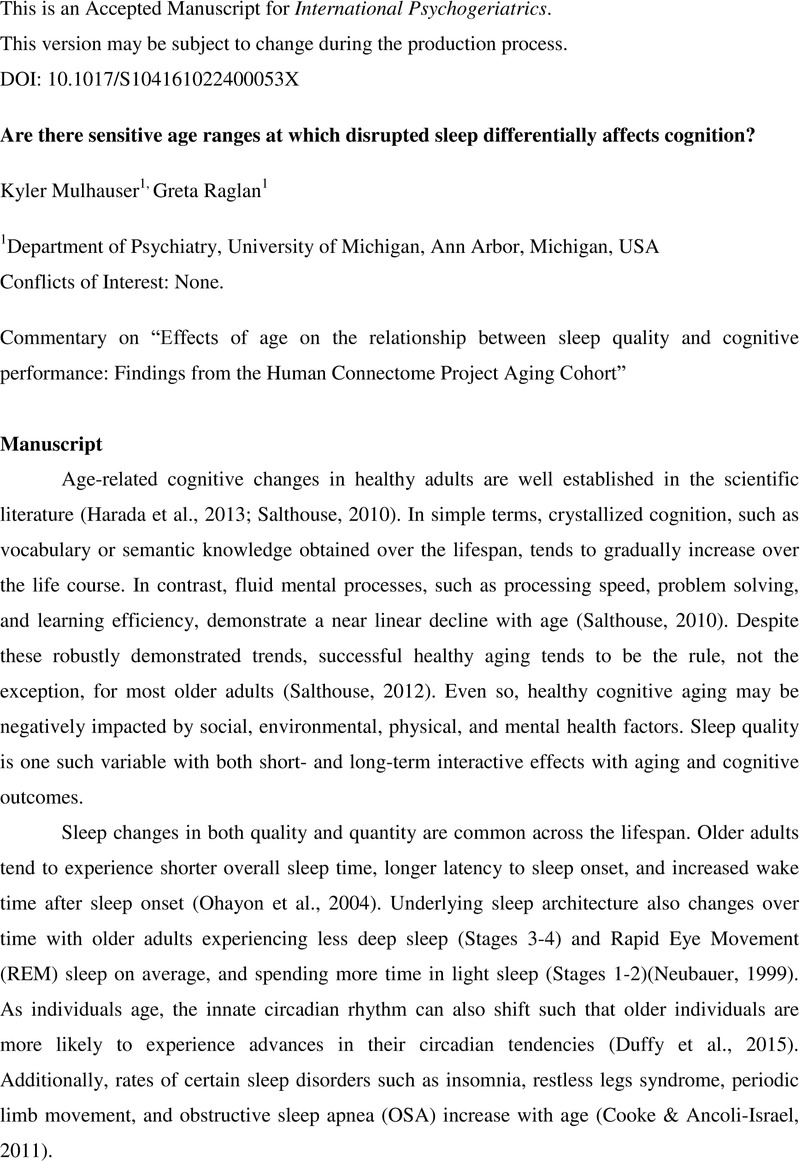No CrossRef data available.
Article contents
Are there sensitive age ranges at which disrupted sleep differentially affects cognition?
Commentary on “Effects of age on the relationship between sleep quality and cognitive performance: Findings from the Human Connectome Project Aging Cohort” by Cohen et al.
Published online by Cambridge University Press: 31 May 2024
Abstract
An abstract is not available for this content so a preview has been provided. Please use the Get access link above for information on how to access this content.

- Type
- Commentary
- Information
- International Psychogeriatrics , Volume 36 , Special Issue 12: Issue Theme: Neurocognitive Disorders , December 2024 , pp. 1086 - 1088
- Copyright
- © The Author(s), 2024. Published by Cambridge University Press on behalf of International Psychogeriatric Association
References
Alhola, P., & Polo-Kantola, P. (2007). Sleep deprivation: impact on cognitive performance. Neuropsychiatric Disease and Treatment, 3(5), 553–567.Google ScholarPubMed
Bubu, O. M., Andrade, A. G., Umasabor-Bubu, O. Q., Hogan, M. M., Turner, A. D., de Leon, M. J., Ogedegbe, G., Ayappa, I., Jean-Louis, G., Jackson, G., M., L., Varga, A. W., & Osorio, R. S. (2020). Obstructive sleep apnea, cognition and Alzheimer’s disease: a systematic review integrating three decades of multidisciplinary research. Sleep Medicine Reviews, 50, 101250. https://doi.org/10.1016/j.smrv.2019.101250CrossRefGoogle ScholarPubMed
Cohen, D. E., Kim, H., Levine, A., Devanand, D. P., Lee, S., & Goldberg, T. E. (2023). Effects of age on the relationship between sleep quality and cognitive performance: Findings from the Human Connectome Project Aging Cohort, International Psychogeriatrics, 1–11 (in press).Google ScholarPubMed
Cooke, J. R., & Ancoli-Israel, S. (2011). Normal and abnormal sleep in the elderly. In Handbook of Clinical Neurology. vol. 98, p. 653–665). Elsevier. https://doi.org/10.1016/B978-0-444-52006-7.00041-1
Google Scholar
Dillon, H. R., Lichstein, K. L., Dautovich, N. D., Taylor, D. J., Riedel, B. W., & Bush, A. J. (2015). Variability in self-reported normal sleep across the adult age span. The Journals of Gerontology Series B: Psychological Sciences and Social Sciences, 70
(1), 46–56. https://doi.org/10.1093/geronb/gbu035
CrossRefGoogle ScholarPubMed
Duffy, J. F., Zitting, K.-M., & Chinoy, E. D. (2015). Aging and circadian rhythms. Sleep Medicine Clinics, 10(4), 423–434. https://doi.org/10.1016/j.jsmc.2015.08.002CrossRefGoogle ScholarPubMed
Dunietz, G. L., Chervin, R. D., Burke, J. F., Conceicao, A. S., & Braley, T. J. (2021). Obstructive sleep apnea treatment and dementia risk in older adults. Sleep, 44(9), zsab076. https://doi.org/10.1093/sleep/zsab076
CrossRefGoogle ScholarPubMed
Durmer, J. S., & Dinges, D. F. (2005). Neurocognitive consequences of sleep deprivation. Seminars in Neurology, 25(1), 117–129.CrossRefGoogle ScholarPubMed
Ercolano, E., Bencivenga, L., Palaia, M. E., Carbone, G., Scognamiglio, F., Rengo, G., & Femminella, G. D. (2023). Intricate relationship between obstructive sleep apnea and dementia in older adults. GeroScience, 46(1), 99–111. https://doi.org/10.1007/s11357-023-00958-4
CrossRefGoogle ScholarPubMed
Goel, N., Rao, H., Durmer, J., & Dinges, D. (2009). Neurocognitive consequences of sleep deprivation. Seminars in Neurology, 29(04), 320–339. https://doi.org/10.1055/s-0029-1237117
CrossRefGoogle ScholarPubMed
Harada, C. N., Natelson Love, M. C., & Triebel, K. L. (2013). Normal cognitive aging. Clinics in Geriatric Medicine, 29(4), 737–752. https://doi.org/10.1016/j.cger.2013.07.002
CrossRefGoogle ScholarPubMed
Jeste, D. V. (Ed.) 2020). Issue theme: Sleep and sleep disorders in older adults. International Psychogeriatrics, 32. https://doi.org/10.1017/S1041610220001611
Google Scholar
Kohn, J. N., Troyer, E., Guay-Ross, R. N., Wilson, K., Walker, A., Spoon, C., Pruitt, C., Lyasch, G., Pung, M. A., Milic, M., Redwine, L. S., & Hong, S. (2020). Self-reported sleep disturbances are associated with poorer cognitive performance in older adults with hypertension: a multi-parameter risk factor investigation. International Psychogeriatrics, 32(7), 815–825. https://doi.org/10.1017/S1041610219001492
CrossRefGoogle ScholarPubMed
Lo, J. C., Loh, K. K., Zheng, H., Sim, S. K. Y., & Chee, M. W. L. (2014). Sleep duration and age-related changes in brain structure and cognitive performance. Sleep, 37(7), 821–821. https://doi.org/10.5665/sleep.3832
CrossRefGoogle ScholarPubMed
Neubauer, D. N. (1999). Sleep problems in the elderly. American Family Physician, 59(9), 2551–2558.Google ScholarPubMed
Ohayon, M. M., Carskadon, M. A., Guilleminault, C., & Vitiello, M. V. (2004). Meta-analysis of quantitative sleep parameters from childhood to old age in healthy individuals: developing normative sleep values across the human lifespan. Sleep, 27(7), 1255–1273. https://doi.org/10.1093/sleep/27.7.1255
CrossRefGoogle ScholarPubMed
Salthouse, T. A. (2010). Selective review of cognitive aging. Journal of the International Neuropsychological Society, 16(5), 754–760. https://doi.org/10.1017/S1355617710000706
CrossRefGoogle ScholarPubMed
Salthouse, T. A. (2012). Consequences of age-related cognitive declines. Annual Review of Psychology, 63(1), 201–226. https://doi.org/10.1146/annurev-psych-120710-100328
CrossRefGoogle ScholarPubMed
Siddarth, P., Thana-udom, K., Ojha, R., Merrill, D., Dzierzewski, J. M., Miller, K., Small, G. W., & Ercoli, L. (2021). Sleep quality, neurocognitive performance, and memory self-appraisal in middle-aged and older adults with memory complaints. International Psychogeriatrics, 33(7), 703–713. https://doi.org/10.1017/S1041610220003324
CrossRefGoogle ScholarPubMed
Wong, R., & Lovier, M. A. (2023). Sleep disturbances and dementia risk in older adults: findings from 10 years of National U.S. Prospective Data. American Journal of Preventive Medicine, 64(6), 781–787. https://doi.org/10.1016/j.amepre.2023.01.008
CrossRefGoogle ScholarPubMed


